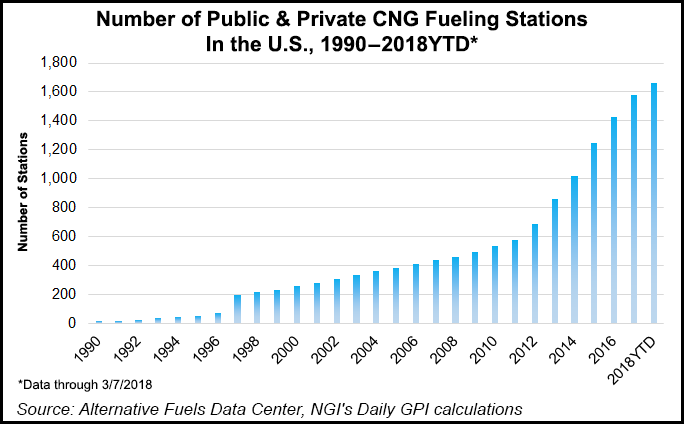Infrastructure | NGI All News Access | NGI The Weekly Gas Market Report
DOE Steps on (Natural) Gas with $12M Early Stage Engine Research Funding
The U.S. Department of Energy (DOE) has allocated $12 million for multiple early stage natural gas vehicle (NGV) research projects at universities and federal laboratories to spur more private sector involvement in alternative transportation fuels.

More than $4 million was awarded to three university research teams for medium- and heavy-duty on-road NGV engines, while $3 million would go to two national laboratories to advance engine emissions reductions, and $5 million for two universities and various DOE laboratories to research fluid power systems in off-road construction and farming vehicles.
The emphasis is on “cost-effective, diesel-like efficiency” in applying natural gas to the movement of goods nationally, DOE said.
University projects include:
Six DOE national laboratories would split $3 million to research active/durable catalysts and fundamental in-cylinder emissions and emissions-control advancements: Argonne National Laboratory, National Renewable Energy Laboratory, Oak Ridge National Laboratory, Pacific Northwest National Laboratory and Sandia National Laboratory.
Another $5 million would be used to research fluid power systems for off-road equipment such as backhoes, excavators and plows. Included in the funding are Purdue University ($1.5 million) and the University of Minnesota ($1.4 million).
In other news, Mexico City plans to convert more than 400 municipal fleet vehicles to compressed natural gas inan effort to convert up to 1,000 vehicles. The cost of the conversions is $2,000-2,600 per vehicle. Mexico City intends to develop more of a network of NGV and electric vehicle multi-fuel refueling stations. The city’s metro public transportation system maintains a mobile fueling capability.
“All our government agencies will be adding this type of vehicle that you will see running in the country’s capital city,” said Mexico City government head Miguel Angel Mancera Espinosa. “It is a clear signal that the government of Mexico City is committed to protection and environment.”
© 2024 Natural Gas Intelligence. All rights reserved.
ISSN © 1532-1231 | ISSN © 2577-9877 | ISSN © 1532-1266 |
